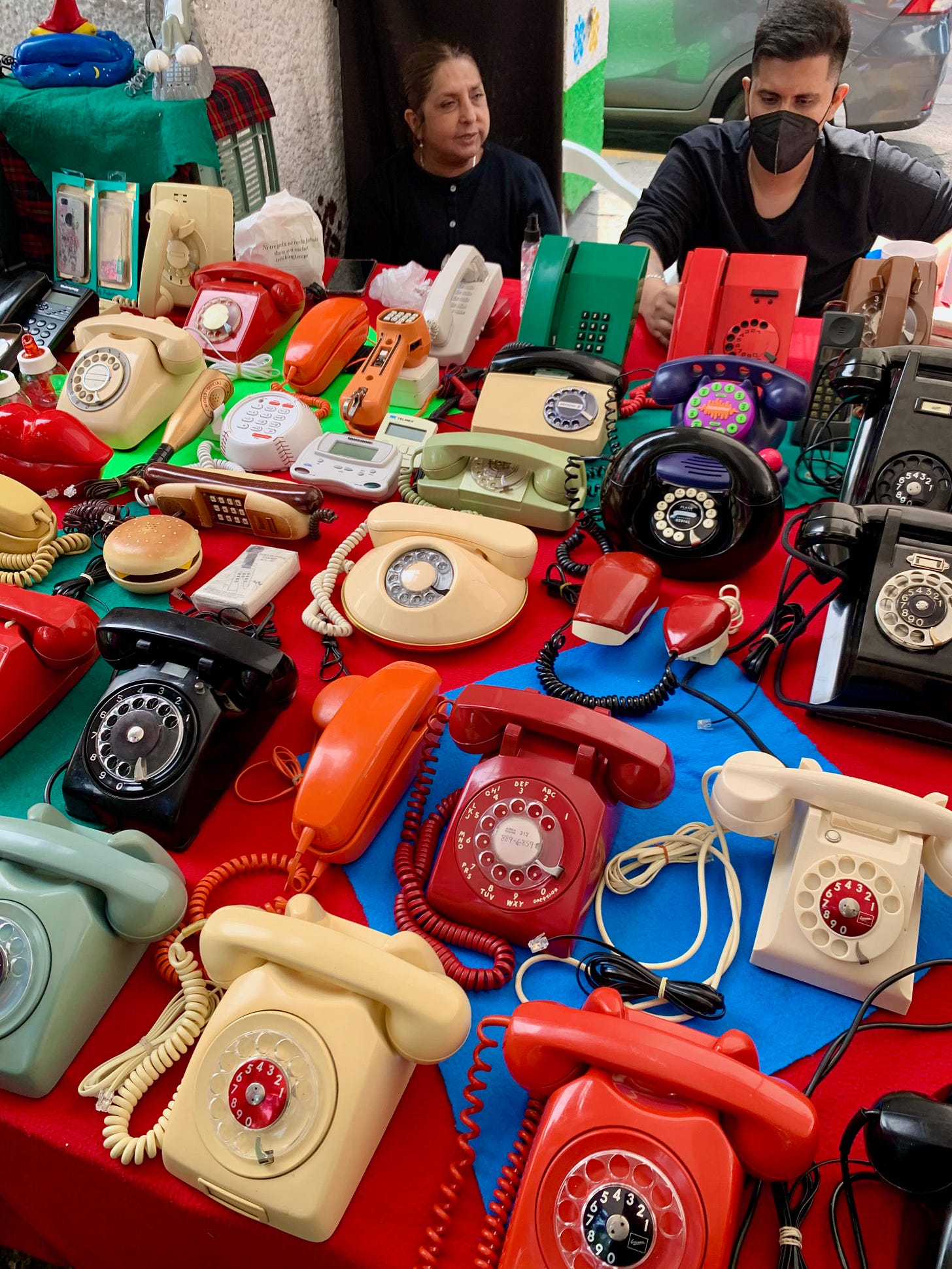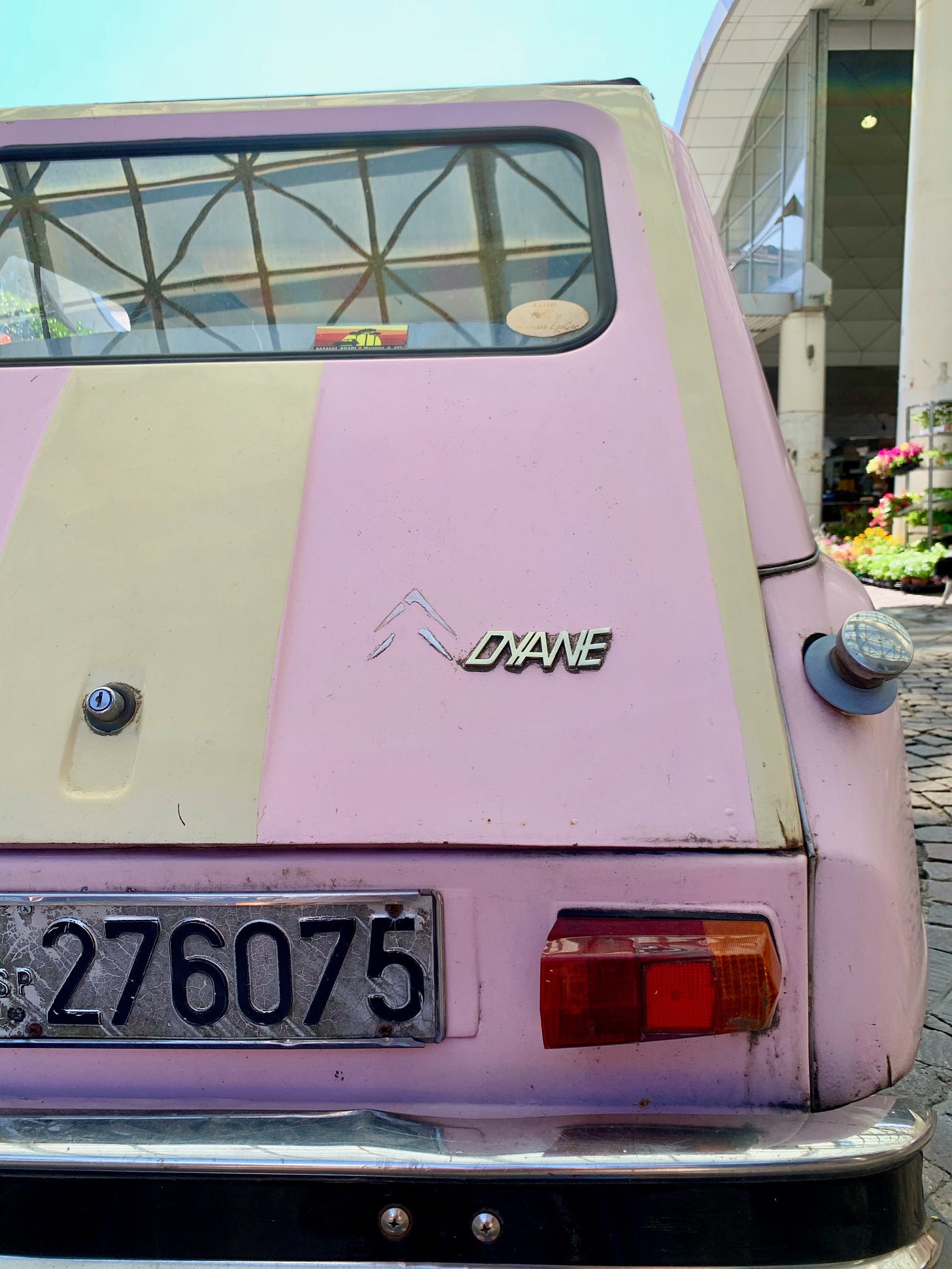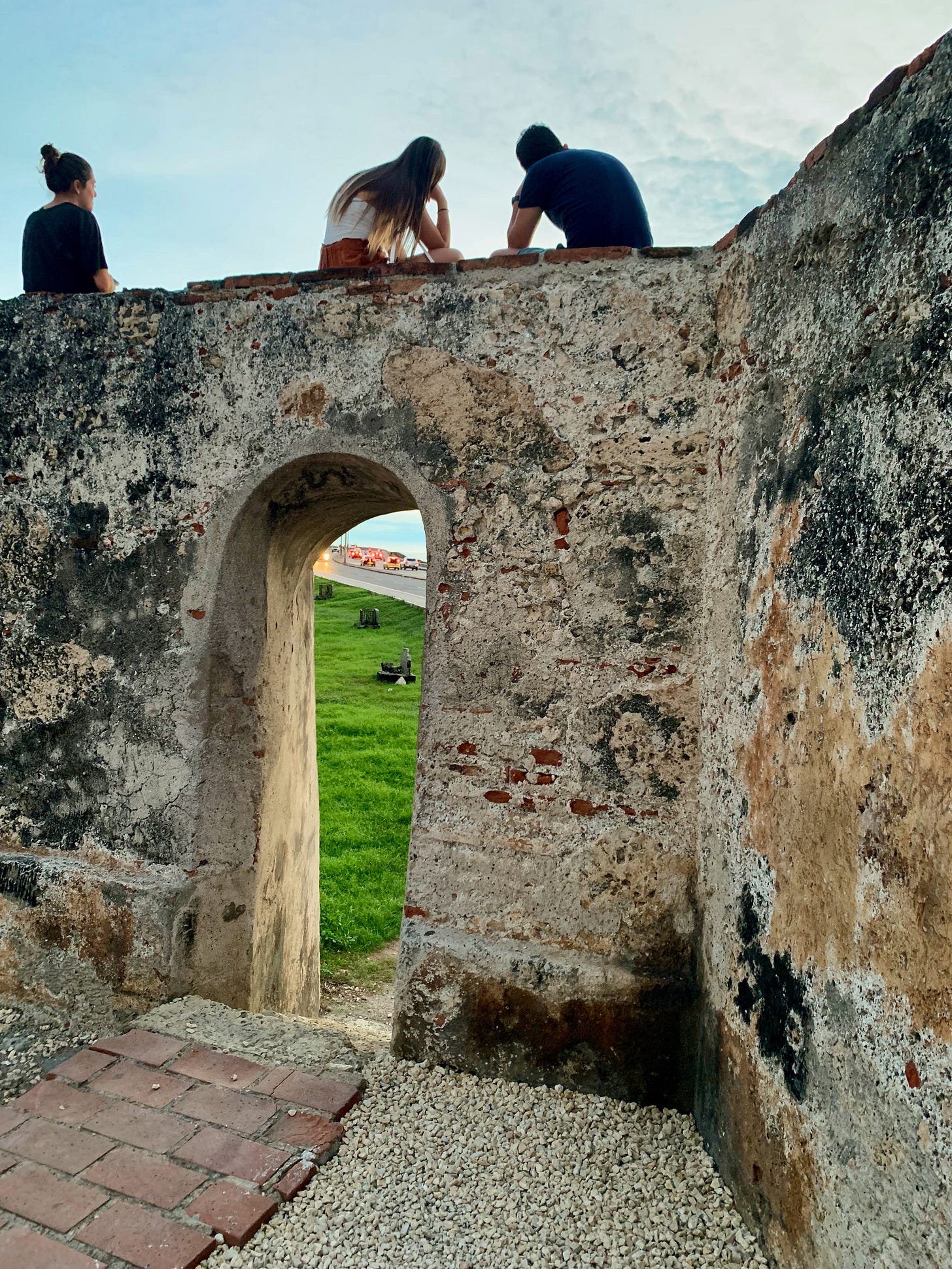Walking into the apartment, something is amiss, did the person cleaning leave midway through the job? Sugar is scattered across the floor and dirty dishes are in the dishwasher, yet the beds are made and the bathroom is spotless. We try to connect to wifi but see it’s an antiquated setup and not functional. We call our Airbnb hosts who run right over to help. The city handles the wifi, but they’ll put a request in, and the cleaner can come back in the morning. Feeling resolved we lay down after a long travel day and fall asleep instantly.
Around 2 am we both lurch upright in bed, bleary-eyed, not knowing where we are or what’s happening. Sounds of glass crashing and screeching metal filled the room. Did an entire kitchen drop from the sky? Out the window I see a truck’s arm hoisting thousands of glass bottles up into the sky, pivoting, and then dumping them into the belly of the truck. This process starts again at 3:30 am. And at 4:15. And 5:30.

A line item in the nomadic contract that you’ve unknowingly signed off on the day you leave is agreeing to frequent housing hiccups and the occasional disaster. No matter how diligently you research, there can, and will be, surprises with your accommodation. I’ve had three major Airbnb snafus in my four years of living this way. All three hosts have impeccable reviews. They are all lovely people with well-appointed apartments we were welcomed into.
The first showdown was between us and a glass recycling receptacle in La Spezia during Italy’s busiest week of the year. The second, in Buenos Aires, was between us and two construction projects, one legal and the other illegal, but together they worked in concert to shake the walls so violently, that we nearly fell out of bed. And most recently in Antigua, us vs. an adorable baby, who was a delight in daytime hours, but woke us up reliably at 2, 3, and 5 am.
In the plethora of Airbnbs I’ve stayed in, the issues that have popped up with the apartment itself (broken bed frame or missing amenities) have been solved swiftly. Hosts are typically responsive. The more extreme situations have exclusively been with outside forces, and more often than not, with Airbnb itself.
I always thought Airbnb was the key to accessing a new destination less like a tourist and more like a local. However, with time I have learned that Airbnb is not the key, instead, they are the middleman, with all that entails. Middlemen are hands-off and don’t have decision-making power. At best Middlemen are there to reassure you and act as a trusted buffer between the host and guest.
If they’re the bridge of trust, it makes sense to go straight to them with any problem, and that is exactly what Airbnb instructs you to do. They have one refrain when it comes to problems: call us immediately. I have followed this protocol exactly, and all it has spelled is further disaster. So my advice for when problems pop up is…
Don’t Call Airbnb
Not calling will feel counterintuitive, but in my 15 years of using Airbnb, speaking to them has made every situation much worse, not better. They try to pressure you by claiming they can’t help you if you don’t reach out promptly in the first 24 hours, but calling them will drastically amplify your aggravation and turn the problem into problems.
Because you hand over your money to Airbnb, it seems like they are in charge of it, but they aren’t—the host is. All Airbnb will do is play telephone between you and the host, and inform them you’d like a refund, that’s it. They don’t demand or convince, and they certainly aren’t going to offer up money out of their pocket to cover any issue. Why would they? They’re the middleman. They have nothing to do with any of it.
So what should you do?
Call Your Host
Whatever is happening, it’s up to you and the host to figure it out, and you two alone. Try to reframe it this way, and stop considering Airbnb as a resource of any kind. Whenever I’ve called them, their involvement escalated everything drastically. What starts as an awkward exchange between you and the host instantly becomes contentious when they show up to mediate. The implication is that the issue is serious enough to need a mediator. Grab your armor, we are going into battle!
If you handle the awkward exchange yourself, you’ll get to a solution quicker than through a third party who has another agenda and no knowledge of the situation. Before you scream out, “But wait, some hosts are completely unreasonable, unprofessional, and corrupt!” Yes, I’ve tangled with them too. This happens and it sucks, but Airbnb cannot tame crazy either.
Consider Leaving
Taking yourself out of an uncomfortable environment will help you get into a better headspace to problem-solve. In many instances, I wish I had left much sooner. If things aren’t ok/sanitary/safe, definitely leave, but in many cases, that isn’t so easy or even possible. It's an easier choice if you’ve booked the place for a weekend, and can move to a hotel for your remaining nights, but it’s a little harder if your stays are for a month plus like mine are. Leaving is also potentially expensive. If I’ve got a month-long stay that costs $3,000 I need to know if I’m going to get that refunded to understand the budget for whatever I’m going to find to replace it.
In the battle between us and the Italian glass recycling receptacle, I called Airbnb the moment we woke up from not sleeping a single hour our first night, and they promised me we’d be in a new place before the end of the day. Little did the person making that promise know that every hotel and Airbnb was booked for a 50-mile radius due to Ferragosto, Italy’s biggest holiday weekend.
Airbnb continued to promise to rehouse us, but without inventory, it was impossible. Two further frustrations were that every customer service rep I spoke with was on the West Coast of the US and every 24 hours I would get assigned a new one. The nine-hour time difference between us wreaked havoc, and having to re-explain the problem every day thwarted any progress. They called at 2, 3, and 4 am and, well, I’d answer because the never-ending waterfall of glass bottles meant I was awake and desperate. I can’t imagine why they didn't have an EU-based team or a way to assign one person to your case. My mistake was that I trusted them to be the expert, but I was, in fact, the expert at finding housing on the fly.
One day turned into three, which turned into a week. We finally left 16 sleepless nights after checking in. In the end, Airbnb never found us new accommodations, I did.

This Isn’t Going to Be Pretty
Sure, moving two times was not what I signed up for, but it was better than the soundtrack of bottles breaking a few feet from my head. What I wish I had known is that in these situations no one was going to win, and I was going to, perhaps, lose the most. If I had accepted that sooner, I could have gotten through the shock that this was unacceptable, and past the anger that, this was unfair and more quickly entered problem-solving/triage mode.
What I couldn’t get over is that despite not sleeping more than an hour a night, I was, according to Airbnb, going to have to pay for those nights, because I chose to reside in the apartment. Even though I was trapped. There were no hotels or vacant Airbnbs within a two-hour driving radius. This brings me to my biggest discovery, the thing to pull out when all else fails…
Do a Charge-Back on Your Credit Card
Even though the host agreed to fully refund me on day one, Airbnb’s middlemen painfully slowed down our path to a solution. It turns out they aren’t very good at playing telephone, their one job here. While unloading to a friend, she suggested I go directly to Amex. I called and asked them to do a charge-back on the Airbnb charge. After an investigation, Amex returned my $2500 in full, and I never had to talk to Airbnb about it again. Imagine if I had thought of that earlier and could have skipped the 16 nights of hell.
Why Build Walls Between Guests and Hosts?
Giorgia and her husband, our hosts in La Spezia, were lawyers. Upon learning of the problem, they contacted the local government. A key card was required to open the receptacle, and it should have been inaccessible during the night. Their commitment and effort to help us were impressive, and touching. Knowing they were trying to get us into a better situation helped us cope. Which makes me ask…
Airbnb’s marketing showcases how they bring distant people together, so why do they prevent communication when problems pop up? This is pure conjecture, but I think their insistence on mediating disputes is designed to protect themselves from liability. If they can document the dispute they can more easily protect themselves from it. I imagine Airbnb’s biggest expense is customer support, and it appears they go to great lengths to minimize this—to both the guests’ and hosts’ detriment. From my abysmal calls, they seemed to prioritize hosts, but after talking to friends who host, I found they have similar customer service horror stories. Not surprisingly, it seems Airbnb isn’t prioritizing anyone but Airbnb.
In confrontations, facing your opposition typically fosters empathy and understanding. Talking to Giorgia revealed that she would lose all her income for a month, for something out of her control. That was as infuriating as me unexpectedly losing my housing for a month. We were in parallel situations, going through the same set of emotions. It was strangely comforting to realize this. We would strategize over WhatsApp about what to say to Airbnb. Our collaborative job became managing their ineffectiveness. This was a very low point in my traveling, but it reminds me of why I’m always drawn to travel. Connection is powerful. Good people, ones that don’t even speak your language, show up when you need help. Humanity can be trusted.
Not Airbnb middlemen.
Today I’m in my hometown of Winter Haven, FL
I’m helping my mom downsize for an upcoming move, and I’m downsizing too—what little I have left that I store at her house. It’s bringing in all the feels. I’m planning on recording a podcast episode about my new-found relationship with consumerism while I’m physically standing in the thick of this.
But today I’ll follow my morning routine of coffee followed by 2500 m worth of laps at the Rowdy Gaines pool, where I competed in high school. I’m usually the youngest one there, and the seniors who have two or three decades on me, are faster. It’s glorious every time they overtake me.









Can't wait for your "consumerism" podcast episode. I did a serious deep dive the last six months. Theres a four part documentary called Century of the Self, maybe you've seen it, highly recommend.
This is so helpful! Reddit mistakenly thinks I'm an airbnb host and I get drawn in and end up scrolling the Airbnb host sub from time to time, and 90% of the complaints are about Airbnb itself and particularly the customer service. I've passively learned so much about how badly they treat hosts, all of whom seem desperate to make their guests happy. Airbnb is awful but I'm glad you've learned (and taught) how to game it!